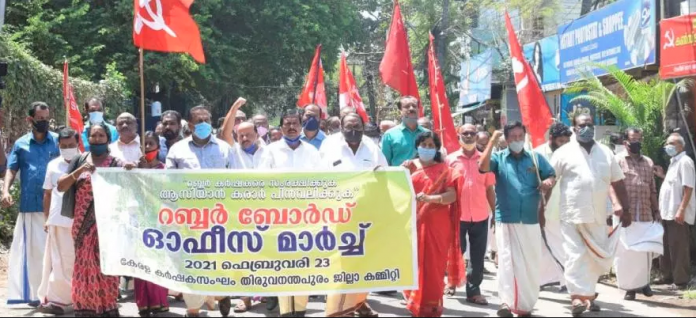The rubber farmers said that they have been affected by the drastic reduction in import tariffs on rubber products and the dip in MSP post-India Free Trade Area (AIFTA). The rubber production continues to remain curtailed after a lockdown in the state.
Shalini S, TwoCircles.net
Kerala: Scores of farmers in the Indian state of Kerala have been protesting and demanding that the Central government should withdraw from the Association of Southeast Asian Nations (ASEAN) agreement.
The farmers TwoCircles.net talked to said that they have been affected by the drastic reduction in import tariffs on rubber products and the dip in MSP post-India Free Trade Area (AIFTA).
The rubber production continues to remain curtailed after a lockdown in the state, they said.
The ASEAN – India free trade agreement (AIFTA) that came into force on January 1, 2010, granted trade liberalization for multinational companies and left the farmers at a great disadvantage.
As cheaper rubber products started to flood the country from countries like Indonesia and Malaysia, the state’s rubber price took a dip. The price of rubber was over 245 INR per kg before the free trade agreement and at present, it is 131 INR per kg.
The Left Democratic Front (LDF) government in Kerala had shown its resentment against the agreement in 2009 and demonstrated its disapproval by forming a 910 km human chain from Thiruvananthapuram to Kasaragod. Several farmers’ organizations had staged protests against the agreement across the nation.
In late February this year, Kerala Karshaka Sangham – Kerala chapter of the All India Kisan Sabha (AIKS) marched in protest against the ASEAN agreement towards the regional office of Rubber Board in Thiruvananthapuram.
According to the farmers, the rubber production in the state has decreased from 7.71 lakh tons in 2010-2011 to an awful lesser production rate of 5.4 lakh tons in 2018-2019.
Furthermore, the farmers lament facing financial crunches in lockdown, as the tapping season ended in February last year, the stocks didn’t move as retailers and rubber products manufacturing companies were not able to procure during the economic meltdown.
Studies also show “India’s negative balance of trade in rubber and rubber products.”
ASEAN-India FTA and India’s balance of trade in rubber and rubber products: A preliminary assessment (2016), a study conducted by Rubber Research Institute of Kottayam highlights India’s trade deficit as the country showed an increasing import of raw materials while alarmingly “nullifying India’s historically inherited advantages in the external trade in finished products.”
Again in November 2019, the PHD Chamber of Commerce and Industry pointed out the trade deficit of the country in its report.
A farmer from Kollam in Kerala grieves that, “Treating of rubber as industrial product affects the state subsidiaries we receive. The costs of fertilizers are also doubled post-AIFTA, rubber trees demand a high rate of supplementation. How do we afford the money? These kinds of policies only support private companies like MRF tyres.”
K.N. Balagopal, the state secretary of Kerala Karshaka Sangham (KKS) told NewsClick, “The rubber farmers in Kerala are struggling and recent years have seen a drastic decline in rubber prices. But, when rubber prices dropped, prices of the products from rubber including the tire did not decrease. Then where does the money go? Only farmers have to suffer.”
He also alleged that three contentious laws passed by the BJP led union government in 2020 is the result of the ASEAN agreement signed by the then Congress-led government of India.
However, in the Budget 2021, the Kerala government has hiked the minimum selling price of rubber to 170 INR per kg from 150 INR per kg to incentivize the small scale, rubber growers.

